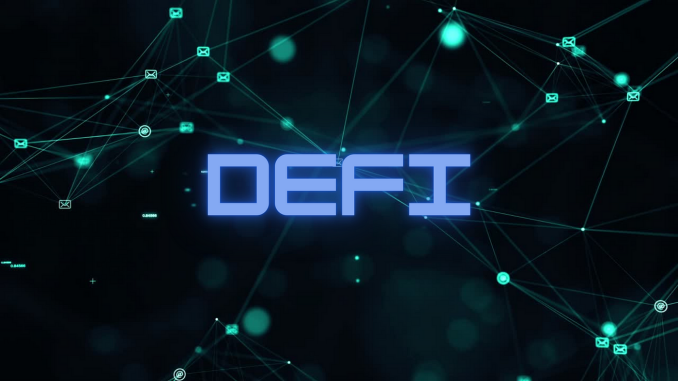
Welcome to the future of finance! In a world where technology continues to shape our every interaction, it’s no surprise that even traditional financial systems are undergoing a revolution. Enter decentralized finance, or DeFi for short – the game-changing concept that is set to disrupt the way we borrow, lend, invest and transact. Whether you’re an avid investor or just someone curious about the latest trends in fintech, exploring DeFi is like embarking on an exhilarating journey into uncharted territory. So fasten your seatbelts as we delve deep into this decentralized finance revolution and discover its transformative potential. Get ready to unlock new possibilities and reimagine what’s possible in the world of finance!
What Is Decentralized Finance (DeFi)?
Decentralized Finance, commonly known as DeFi, is a groundbreaking concept that aims to revolutionize traditional financial systems by leveraging the power of blockchain technology. Unlike centralized financial institutions like banks, which act as intermediaries and have control over user funds, DeFi operates on decentralized networks where transactions are transparent and accessible to anyone.
At its core, DeFi seeks to eliminate barriers and provide equal opportunities for individuals across the globe to access financial services. It enables users to engage in various activities such as lending, borrowing, trading, investing, and more without relying on middlemen or intermediaries. Instead of placing trust in centralized authorities or third parties to facilitate transactions or manage assets, DeFi protocols utilize smart contracts – self-executing agreements stored on the blockchain – ensuring transparency and security.
One of the key features of DeFi is its open-source nature. Developers can build applications (dApps) on existing blockchain platforms like Ethereum using programmable smart contracts. This allows for interoperability between different protocols within the ecosystem while fostering innovation through collaboration.
The decentralized nature of DeFi also means greater accessibility for individuals who may not have had access to traditional banking services due to geographical constraints or lack of documentation. By eliminating these barriers and establishing a permissionless system where anyone with an internet connection can participate, DeFi has huge potential for financial inclusion worldwide.
Furthermore, since most DeFi applications run on public blockchains like Ethereum that operate 24/7 without downtime or restrictions imposed by conventional institutions’ operating hours, it offers unparalleled convenience and flexibility for users worldwide.
Decentralized Finance (DeFi) represents a paradigm shift in how we perceive finance. By harnessing blockchain technology’s transformative power – transparency, security,and immutability – it opens up new possibilities while challenging traditional financial systems’ status quo. Whether you’re someone looking for alternative investment options or seeking greater control over your finances minus hefty fees associated with intermediaries, DeFi holds immense potential. As we explore the intricacies of this decentralized ecosystem, one thing is certain – DeFi is here to stay and has the potential to disrupt traditional finance as we know it.
How Does DeFi Work?
Decentralized Finance, or DeFi, has been gaining significant attention in the financial world. But how exactly does it work? Let’s dive into the mechanics of this revolutionary concept.
At its core, DeFi leverages blockchain technology to create a decentralized ecosystem for financial applications. Instead of relying on traditional intermediaries like banks or brokers, DeFi operates through smart contracts on a blockchain network. These smart contracts are self-executing agreements that automatically perform predefined actions when specific conditions are met.
One key aspect of DeFi is its open and permissionless nature. Anyone with an internet connection can access these decentralized applications (DApps) and participate in various financial activities such as lending, borrowing, trading, and asset management. This accessibility eliminates barriers that may exist in traditional finance due to geographic location or lack of documentation.
To facilitate these functions, DeFi projects typically rely on stablecoins – digital currencies pegged to real-world assets like the US dollar – as well as liquidity pools which allow users to pool their funds together for greater efficiency and lower costs.
Furthermore, interoperability plays a crucial role in the functioning of DeFi protocols. Different DApps can integrate with each other seamlessly using standardized interfaces called Application Programming Interfaces (APIs). This enables users to interact with multiple platforms without needing separate accounts for each one.
Security is another vital aspect of DeFi. Blockchain networks provide transparency and immutability by recording all transactions permanently on the ledger. Additionally, since data is distributed across numerous nodes rather than stored centrally, it becomes extremely difficult for malicious actors to manipulate or hack into the system.
Benefits of DeFi
Decentralized Finance (DeFi) has the potential to revolutionize traditional financial systems by providing a range of benefits. One key advantage is that it offers increased accessibility and inclusivity. Unlike traditional finance, which often requires intermediaries like banks or lending institutions, DeFi allows anyone with an internet connection to participate in various financial activities such as lending, borrowing, and trading.
Another benefit of DeFi is its transparency. Since transactions on the blockchain are recorded publicly, users can easily verify and track their funds without relying on a central authority. This transparency also helps reduce fraud and corruption within the system.
Additionally, DeFi eliminates geographical limitations. It enables individuals from different parts of the world to access financial services seamlessly without facing restrictions imposed by traditional banking systems or governments.
Furthermore, decentralized finance promotes financial innovation through smart contracts and protocols built on blockchain technology. These innovations enable programmable money that can automatically execute agreements based on predefined conditions without human intervention.
Moreover, DeFi empowers individuals by giving them more control over their finances. Users have direct ownership and custody of their assets compared to centralized systems where control lies with intermediaries.
Decentralization reduces costs associated with middlemen and lowers transaction fees for users. By eliminating unnecessary fees charged by intermediaries in traditional finance, individuals can save money when participating in various DeFi activities.
These benefits highlight the enormous potential for decentralized finance to transform how people interact with money and reshape the global financial landscape.